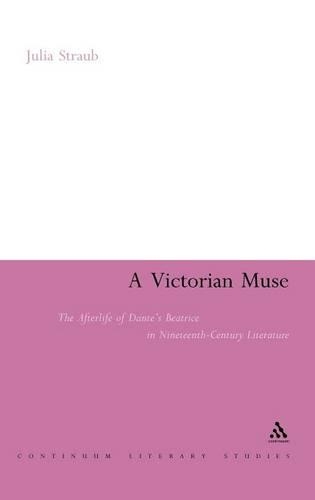
A Victorian Muse: The Afterlife of Dante's Beatrice in Nineteenth-Century Literature
(Hardback)
Available Formats
Publishing Details
A Victorian Muse: The Afterlife of Dante's Beatrice in Nineteenth-Century Literature
By (Author) Dr Julia Straub
Bloomsbury Publishing PLC
Continuum International Publishing Group Ltd.
13th September 2009
United Kingdom
Classifications
Tertiary Education
Non Fiction
820.9008
Physical Properties
Hardback
192
Width 156mm, Height 234mm
Description
The figure of Dante's Beatrice can be seen as a cultural phenomenon or myth during the nineteenth century, inspiring a wide variety of representations in literature and the visual arts. This study looks at the cultural afterlife of Beatrice in the Victorian period in remarkably different contexts.
Focusing on literary representations and selected examples from the visual arts, this book examines works by Dante Gabriel Rossetti and Christina Rossetti, George Eliot, Alfred Lord Tennyson and Walter Pater as well as by John Ruskin, Maria Rossetti and Arthur Henry Hallam. Julia Straub's analysis shows how the various representations of Beatrice in literature and in the visual arts reflect in meaningful ways some of the central social and aesthetic concerns of the Victorian period, most importantly its discourse on gender.
This study offers fascinating insights into the Victorian reception of Dante by exploring the powerful appeal of his muse.
Reviews
"A Victorian Muse makes an important contribution to research on the nineteenth-century reception of Dante. Julia Straub's approach combines theoretical sophistication with clarity of exposition and wide-ranging scholarship. Her work will also be of value to those interested in gender issues, aesthetics and relationships between media during the period." - Nick Havely, Professor of English & Related Literature, University of York, UK; editor of Dante's Modern Afterlife
"If Dante is 'the central man of all the world' as Ruskin argued, then Beatrice, as Julia Straub so beautifully argues, is the central woman, a figure who embodies the idealisations of Victorian culture, but also their critique. The most arresting chapter for me was that on Walter Pater, where Straub demonstrates that a study of Beatrice's redemptive femininity actually allows the articulation of a specifically masculine mode of creativity." - Alison Milbank, Associate Professor, Department of Theology, The University of Nottingham, UK
Reviewed in The Year's Work in English Studies, Volume 90
Author Bio
Julia Straub is Lecturer in Literatures in English at the University of Berne, Switzerland.
